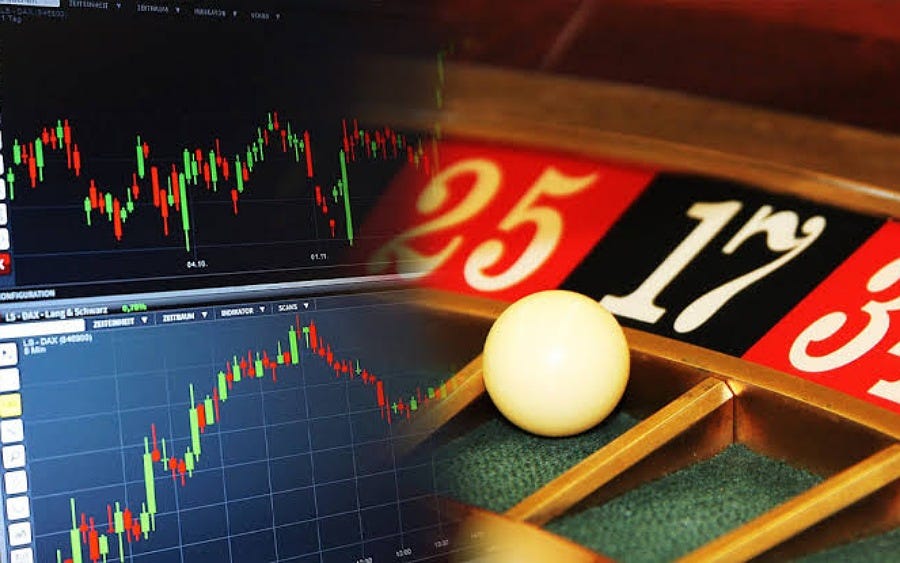In the complex world of trading, a question often arises: is it a form of gambling? This article aims to explore this topic from an informative and analytical standpoint, backed by evidence and logical reasoning.
By examining the definition of gambling and the role of chance in trading, we will delve into the importance of strategy online casino malaysia, analysis, and risk management in distinguishing trading from gambling.
Join us on this journey to gain a deeper understanding of the similarities and distinctions between these two activities.

The Definition of Gambling in Trading
In order to accurately assess whether trading can be classified as gambling, it is crucial to establish a clear definition of gambling within the context of financial markets. Gambling is generally understood as engaging in an activity where the outcome is uncertain and involves risking money or valuable assets on an uncertain event. However, when it comes to trading, the situation is more complex.
Trading involves making informed decisions based on analysis, research, and market trends. It requires a deep understanding of the financial markets, as well as the ability to manage risk effectively. While emotions can play a role in trading, successful traders are able to control their emotions and make rational decisions based on evidence and analysis.
Market trends also have a significant impact on trading. Traders study market trends to identify patterns and make predictions about future price movements. This information helps them make strategic decisions and minimize risk.
Overall, while there are elements of uncertainty and risk in trading, it is not solely based on chance like gambling. It requires skill, knowledge, and a disciplined approach to be successful.
Examining the Role of Chance in Trading
The element of chance plays a significant role in the outcome of investment decisions. Trading, like any investment activity, involves a level of uncertainty and randomness that cannot be completely eliminated.
While skill and knowledge are crucial in making informed decisions, chance can still influence the final outcome. This is because market movements are influenced by numerous factors, including economic data, geopolitical events, and investor sentiment, which are often unpredictable.
Traders must understand the psychology of trading and be aware of the biases and emotions that can cloud their judgment. By recognizing the role of chance and understanding the interplay between skill and luck, traders can adopt strategies that manage risk and maximize their chances of success in the dynamic and unpredictable world of trading.
The Importance of Strategy and Analysis in Trading
Effective trading requires a comprehensive understanding of market trends and a well-thought-out approach that incorporates strategic analysis. The role of emotions in trading cannot be underestimated, as they can cloud judgment and lead to irrational decision-making. When it comes to trading, emotions such as fear and greed can often override logic, causing traders to make impulsive and potentially detrimental choices.
This is where market trends play a crucial role in shaping trading strategies. By analyzing and understanding market trends, traders can identify potential opportunities and make informed decisions based on objective data rather than emotional impulses. Market trends provide valuable insights into the behavior of various assets, allowing traders to adjust their strategies accordingly and capitalize on potential profit opportunities.

Risk Management in Trading: Similarities to Gambling
Risk management in the financial markets shares similarities with the concept of probability and uncertainty in games of chance. Just like in gambling, traders face inherent risks and uncertainties when making investment decisions. However, successful trading requires more than just luck; it also requires a deep understanding of trading psychology and emotional control.
In both trading and gambling, there is an element of risk involved. Traders must carefully manage their exposure to potential losses and implement strategies to minimize the impact of unexpected market movements. Similarly, gamblers must assess the risk-reward ratio before placing bets and employ risk management techniques to protect their bankroll.
Trading psychology plays a crucial role in both activities. Traders need to maintain a disciplined mindset and make rational decisions based on evidence and analysis, rather than succumbing to emotions such as fear or greed. Similarly, gamblers who let their emotions guide their decisions often end up making poor choices and suffering significant losses.
The Distinction Between Trading and Gambling
A key differentiation between trading and gambling lies in the level of knowledge and skill required to achieve consistent success. While both activities involve risk-taking, trading requires a deep understanding of financial markets, technical analysis, and risk management strategies.
In contrast, gambling relies primarily on chance and luck. The psychology of trading also sets it apart from gambling. Successful traders develop discipline, patience, and emotional control, whereas gamblers often exhibit impulsive behaviors driven by excitement and the desire for quick gains.
Common mistakes in trading include failure to adhere to a trading plan, overtrading, and letting emotions dictate decision-making. These mistakes can lead to significant losses and hinder long-term profitability.
Therefore, it is essential for traders to continuously educate themselves, develop a robust trading strategy, and manage their psychological biases to achieve consistent success in the financial markets.
Conclusion
In conclusion, while trading and gambling may share some similarities, they are fundamentally different activities.
Trading involves strategic decision-making, analysis, and risk management, whereas gambling relies on chance and luck.
Traders use various tools and techniques to predict market trends and make informed decisions, greatly reducing the element of chance.
Furthermore, the long-term success of traders is often determined by their ability to manage risks effectively.
Therefore, it is inaccurate to categorize trading as purely gambling.





